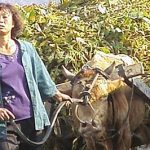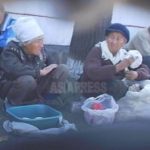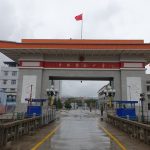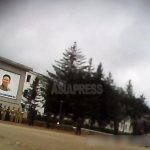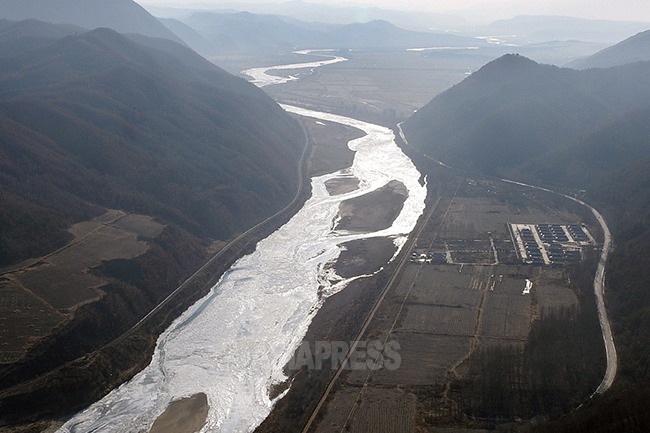
◆ N. Korea’s northern region hits 30 below zero
North Korea went through a cold snap through the first half of January. In Osaka, where I live, the temperature rarely goes down below zero; however, the weather got so cold that the goldfish water tank I keep outside became covered in a thick layer of ice. This winter’s cold snap – said to be the most intense ever – draped itself over East Asia as the region began celebrating Lunar New Year’s. Seoul and Beijing hit temperatures down to 15 degrees below zero, while the Yanbian area in Jilin Province, which sits next to North Korea, hit temperatures reaching 27 degrees below zero.
ASIAPRESS received a report from a reporting partner living in Hyesan, in the northern region of North Korea, during the evening of January 24, just as snow began causing difficulties for people moving around outside in Japan. The reporting partner said that the temperature in his city had reached 30 degrees below zero.
“It’s so cold here we can’t even move an inch. A lot of snow has fallen as well. We’ve got concerns over not only food, but also obtaining firewood, and everyone is worried about how they’ll heat (their houses). It’s winter, so people are suffering much more than normal. There’s people who go around knocking on people’s doors to request entry so they can warm themselves up, and it’s these people who are causing trouble. People don’t feel like they can just shut them out, and it’s hard for people just to sit in their houses these days. There’s even people who have lost a lot of weight because they’ve skimped on meals in order to buy firewood.”
◆ “Furnace cohabitation” – how people without money for fuel survive
In North Korea, people talk about “furnace cohabitation.” It refers to people who can’t afford to buy fuel cohabitating in the same house during the winter season. Indeed, they do this to save as much as possible on heating costs.
Most heating sources in North Korea’s apartments and stand-alone houses are coal and firewood. For a time, the state provided cheap coal for use as heating fuel, but that system more or less disappeared in the 1990s, and it became common practice for people to use cash to buy fuel from sellers.
Currently, people are facing the issue of having no money to spend. For the past three years, the Kim Jong-un regime has implemented excessive policies aimed at combating the COVID-19 pandemic that have led to an economic downturn. Most ordinary people are not able to conduct business activities, and with the loss of daily earnings, they have no sources of cash income. The elderly and other members of the vulnerable classes are suffering from starvation and illnesses that, in some cases, have led to death. Now, with the winter season here, people are facing difficulties in obtaining firewood for heating.
“One ton of coal is 130 yuan, but there’s no one who’ll buy coal by the ton. Five pieces of wood cost 1,400 won. People need money to purchase these things, but no one has money, so they are all suffering worse times than last winter.”
※ In the markets, North Korean won and Chinese yuan are both used. 100 South Korean won equals around 5.5 yuan and 66 North Korean won.
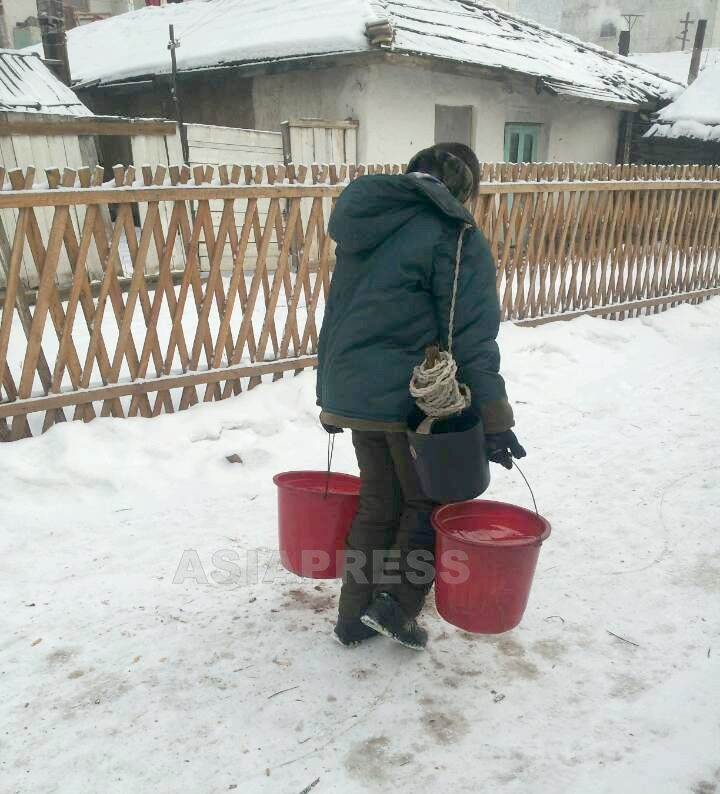
◆ Homeless children freeze to death in Hyesan
The reporting partner told ASIAPRESS that there was a sad incident that occurred in Hyesan during the coldest part of January. Two homeless children were found frozen to death at the construction site of a five-story building. “With the rise in wandering people who have lost their homes due to debt and are living in storage facilities and in front of train stations, the police have been doing daily patrols and putting these homeless people in detention facilities. However, they can’t get much to eat there, so the detainees run away. Two children caught up in the crackdowns ended up (leaving the detainment facility) and sleeping outside before freezing to death.”
The incident became an issue in the halls of government, leading police officers to temporarily place wandering people and homeless children in motels.
◆ Hospitals forcibly discharge patients due to lack of heating
Another reporting partner in North Hamgyung Province told ASIAPRESS that he had experienced a shocking scene at a coal mining town in Eundeok County at the end of last year.
“Children and elderly people were gathering in large numbers (in front of the coal mine) to pick up fallen coal. Mine employees chased the group away and took back the coal the people had picked up. The atmosphere was deadly and there were people crying. A knife fight broke out, leading the police to mobilize to the scene.”
The lack of fuel for heating is not just a problem faced by ordinary households. According to a reporting partner in Hyesan, the largest hospitals in the province, Yanggang Province Hospital and Hyesan City Hospital, have failed to obtain coal since the start of the year, leading them to forcibly discharge patients who are not considered in grave condition. The spike in gasoline prices have reportedly made it impossible for the authorities to transport coal to these institutions.
◆ Ordinary people are in a war with the cold weather
When the cold snap reached its climax, Hyesan authorities finally began to make efforts to provide food and heating to the poorest of the poor in the city.
“Neighborhood watch units selected 2-3 households among the poorest of the poor and supplied them with 150 kilograms of coal each,” a reporting partner in the city said. “The units have also been ordered to help households having a difficult time.”
One neighborhood watch unit is made up of 20-30 households. Typically, a four-person household needs 1-1.5 tons of coal to get through the winter. 150 kilograms of coal is only enough to last for 10 days.
North Korea’s winter is long. The country’s people will be risking their lives against the cold until at least early April.
- Recently obtained “confidential document” signed off by Kim Jong-un reports on a gruesome incident involving a shock brigade
- <Confidential Document> With the collapse of the medical system, Kim Jong-un orders crackdown on home remedies to treat illnesses…Why?
- <Inside N. Korea> The country’s medical system continues its freefall into collapse, with hospitals sending patients back home due to lack of heating
- <Inside N. Korea>Why are food prices skyrocketing at the start of the new year? Anxiety over food shortages leads to hoarding and even people wandering around after falling into financial ruin
- <Inside N. Korea> Cadres shocked by massive personnel shakeup that brings more young people into official positions

